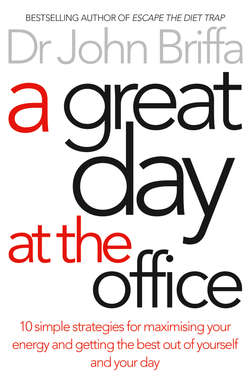Читать книгу A Great Day at the Office: 10 Simple Strategies for Maximizing Your Energy and Getting the Best Out of Yourself and Your Day - Dr. Briffa John - Страница 29
Clutching at Straws
ОглавлениеSome will claim that we need some of this fodder in our diet, though, if for no other reason than to provide fibre required for efficient bowel function. This is another common claim we hear from those who argue for the essential nature of grains in the diet. Again, what does the science show?
The main sort of fibre contained in foods such as wholemeal bread and high-bran breakfast cereals is technically termed ‘insoluble’ fibre (also colloquially referred to as ‘roughage’). Insoluble fibre is said to be important to give the bowel ‘something to grab onto’ and ensure waste moves nicely along our large bowel to be expelled with ease. But is insoluble fibre really essential for bowel regularity and health? There is, in fact, some evidence that suggests it can do more harm than good.
In one study, more than sixty adults with persistent constipation for which no medical cause could be found were asked to take a quite unconventional dietary approach: instead of being asked to eat more fibre, they were asked to eat none at all.7 Study participants were instructed to eliminate breakfast cereals, wholemeal bread and brown rice (as well as fruit and vegetables) from their diets for two weeks. They were asked to continue eating as little fibre as possible if this helped their symptoms.
Six months after the start of the study, the majority of patients had persisted with the ‘no-fibre’ diet and had seen their bowel frequency increase from an average of once every few days to once every day. In contrast, in the minority of individuals who remained on a higher fibre diet, bowel function had not improved at all.
In other words, the results showed that the more fibre there was in the diet, the more constipated individuals tended to be. Here’s how the study authors attempted to explain their findings:
The role of dietary fiber in constipation is analogous to cars in traffic congestion. The only way to alleviate slow traffic would be to decrease the number of cars and to evacuate the remaining cars quickly. Should we add more cars, the congestion would only be worsened. Similarly, in patients with idiopathic constipation [constipation of no known cause] and a colon packed with feces, reduction in dietary fiber would reduce fecal bulk and volume and make evacuation of the smaller and thinner feces easier. Adding dietary fiber would only add to the bulk and volume and thus make evacuation even more difficult.
It’s difficult to argue with the logic here, nor the results achieved in this study. And the results mirror my own experience in practice, where I find stripping out grains from the diet (and leaving fruits and vegetables in) usually improves constipation and other symptoms such as bloating and abdominal discomfort. Scientific research supports this approach in management of ‘irritable bowel syndrome’.8
‘Roughage’ does not seem to be essential for regular bowel function, but some claim it helps prevent colon cancer. The truth is, though, the best evidence does not support this idea at all.9–11 In fact, in a review of the evidence relating to fibre and bowel health, the authors concluded that: ‘there does not seem to be much use for fiber in colorectal diseases.’12
The evidence shows that we simply do not need grains for energy, ‘vital nutrients’ or fibre. But, in addition to their non-essential nature, there are reasons for positively avoiding them. We know, for example, just how disruptive they can be to blood sugar and insulin levels, and how they can impair the nutritional value of food because of the phytates they contain. But grains pose others additional hazards, too, specifically through a mechanism known as ‘food sensitivity’.
